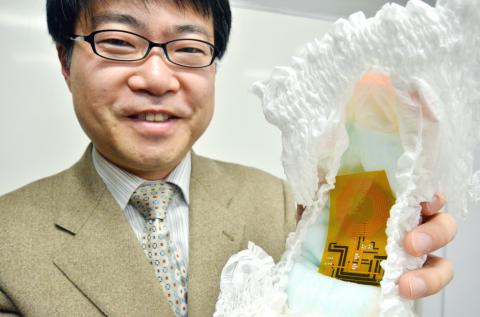A disposable organic sensor that can be embedded in a diaper and wirelessly let a carer know it needs changing was unveiled by Japanese researchers yesterday.
The flexible integrated circuit is printed on a single plastic film, transmits information, receives its power wirelessly and could potentially be manufactured for a few yen, the developers told reporters.
The system, which uses organic materials that can be printed with inkjet technology, was developed by a team led by professors Takayasu Sakurai and Takao Someya at the University of Tokyo.

Photo: AFP
In addition to use in infants’ diapers, the technology can be applied to adult nappies, which are a big-seller in rapidly aging Japan.
Regular diapers change color to indicate they are wet, but a care-giver still needs to take off the wearer’s clothes to see.
“If sensing is done electronically, you can tell simply by coming close to the wearer — without unclothing him or her,” Someya said.
The technology could also be put directly on the skin like a plaster, in place of often ring-shaped devices currently used in hospitals to monitor pulse and blood oxygen levels, he said.
Healthcare sensors often use silicon and other relatively rigid materials that can cause their users discomfort.
The flexibility of a single sheet of plastic film reduces discomfort for wearers and means it can be applied to a larger number of places — offering greater potential for doctors or carers to monitor well-being.
The prototype system that has been developed is capable of monitoring wetness, pressure, temperature and other phenomena that cause a change in electrical resistance, Someya said, but the team would like to refine it to reduce its power consumption before it goes into widespread use.
Currently the data-reading device needs to be a few centimeters from the sensor, but Someya said the team was exploring how practical this is and whether they can boost the distance.
Researchers are to unveil their work at an academic gathering now under way in San Francisco.

‘SWASTICAR’: Tesla CEO Elon Musk’s close association with Donald Trump has prompted opponents to brand him a ‘Nazi’ and resulted in a dramatic drop in sales Demonstrators descended on Tesla Inc dealerships across the US, and in Europe and Canada on Saturday to protest company chief Elon Musk, who has amassed extraordinary power as a top adviser to US President Donald Trump. Waving signs with messages such as “Musk is stealing our money” and “Reclaim our country,” the protests largely took place peacefully following fiery episodes of vandalism on Tesla vehicles, dealerships and other facilities in recent weeks that US officials have denounced as terrorism. Hundreds rallied on Saturday outside the Tesla dealership in Manhattan. Some blasted Musk, the world’s richest man, while others demanded the shuttering of his

ADVERSARIES: The new list includes 11 entities in China and one in Taiwan, which is a local branch of Chinese cloud computing firm Inspur Group The US added dozens of entities to a trade blacklist on Tuesday, the US Department of Commerce said, in part to disrupt Beijing’s artificial intelligence (AI) and advanced computing capabilities. The action affects 80 entities from countries including China, the United Arab Emirates and Iran, with the commerce department citing their “activities contrary to US national security and foreign policy.” Those added to the “entity list” are restricted from obtaining US items and technologies without government authorization. “We will not allow adversaries to exploit American technology to bolster their own militaries and threaten American lives,” US Secretary of Commerce Howard Lutnick said. The entities

Minister of Finance Chuang Tsui-yun (莊翠雲) yesterday told lawmakers that she “would not speculate,” but a “response plan” has been prepared in case Taiwan is targeted by US President Donald Trump’s reciprocal tariffs, which are to be announced on Wednesday next week. The Trump administration, including US Secretary of the Treasury Scott Bessent, has said that much of the proposed reciprocal tariffs would focus on the 15 countries that have the highest trade surpluses with the US. Bessent has referred to those countries as the “dirty 15,” but has not named them. Last year, Taiwan’s US$73.9 billion trade surplus with the US

Prices of gasoline and diesel products at domestic gas stations are to fall NT$0.2 and NT$0.1 per liter respectively this week, even though international crude oil prices rose last week, CPC Corp, Taiwan (台灣中油) and Formosa Petrochemical Corp (台塑石化) said yesterday. International crude oil prices continued rising last week, as the US Energy Information Administration reported a larger-than-expected drop in US commercial crude oil inventories, CPC said in a statement. Based on the company’s floating oil price formula, the cost of crude oil rose 2.38 percent last week from a week earlier, it said. News that US President Donald Trump plans a “secondary